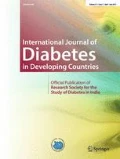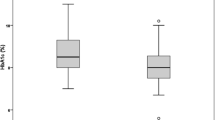Abstract
Diabetes management strategies are interdependent and comprise of three basic key elements: self-care activities, effective drug treatment, and adequate follow-up for early detection of complications. There is a need to assess the levels of self-care practices among diabetic patients and factors influencing them for developing better educational strategies to address the gaps identified. A cross-sectional study was conducted to assess the compliance for self-care activities of type 2 diabetes mellitus patients, in a tertiary care hospital by using the Summary of Diabetes Self-Care Activities (SDSCA) scale among 60 patients aged > 18 years. More than 90% of respondents were compliant for not eating high-fat foods, were not smoking, and were monitoring glucose regularly. One third of respondents were not taking proper foot care. After adjusting for confounders, the proportion of individuals who eat five or more servings of fruits and vegetables were significantly lower in middle and low socioeconomic status (SES) individuals as compared to high SES (middle SES OR 0.06, 95% CI 0.01–0.39; lower SES OR 0.06, 95% CI 0.01–0.60). Females were less likely to be involved in physical activity-related self-care activities as compared to males (minimum 30 min of physical activity: OR 0.27, 95% CI 0.08–0.92; specific exercise sessions: OR 0.15, 95% CI 0.04–0.52). The proportion of diabetics who follow proper foot care instructions were significantly lower among middle SES as compared to upper SES (checking of feet: OR 0.08, 95% CI 0.01–0.47; inspection of footwear: OR 0.08, 95% CI 0.01–0.48). There is a need to emphasize the importance of diet, physical activity, and foot care during the counseling sessions of diabetes mellitus type 2 patients.

Similar content being viewed by others
References
Mohan V, Sandeep S, Deepa R, Shah B, Varghese C. Epidemiology of type 2 diabetes: Indian scenario. Indian J Med Res. 2007;125(3):217–30.
Danaei G, Finucane MM, Lu Y, Singh GM, Cowan MJ, Paciorek CJ, et al. National, regional, and global trends in fasting plasma glucose and diabetes prevalence since 1980: systematic analysis of health examination surveys and epidemiological studies with 370 country-years and 2.7 million participants. Lancet. 2011;378(9785):31–40. https://doi.org/10.1016/S0140-6736(11)60679-X.
Shahin Y, Kapur A, Khader A, Zeidan W, Harries AD, Nerup J, et al. Clinical audit on the provision of diabetes care in the primary care setting by United Nations Relief and Works Agency for Palestine Refugees in the Near East (UNRWA). Journal of Diabetes Mellitus. 2015;5:15–20. https://doi.org/10.4236/jdm.2015.51002.
Osborn CY, Egede LE. Validation of an information-motivation-behavioral skills model of diabetes self-care (IMB-DSC). Patient Educ Couns. 2010;79(1):49–54. https://doi.org/10.1016/j.pec.2009.07.016.
Harvey JN, Lawson VL. The importance of health belief models in determining self-care behaviour in diabetes. Diabetic medicine : a Journal of the British Diabetic Association. 2009;26(1):5–13. https://doi.org/10.1111/j.1464-5491.2008.02628.x.
Bains SS, Egede LE. Associations between health literacy, diabetes knowledge, self-care behaviors, and glycemic control in a low income population with type 2 diabetes. Diabetes Technol Ther. 2011;13(3):335–41. https://doi.org/10.1089/dia.2010.0160.
Tol A, Alhani F, Shojaeazadeh D, Sharifirad G, Moazam N. An empowering approach to promote the quality of life and self-management among type 2 diabetic patients. Journal of Education and Health Promotion. 2015;4:13. https://doi.org/10.4103/2277-9531.154022.
Muninarayana C, Balachandra G, Hiremath SG, Iyengar K, Anil NS. Prevalence and awareness regarding diabetes mellitus in rural Tamaka, Kolar. Int J Diabetes Dev Ctries. 2010;30(1):18–21. https://doi.org/10.4103/0973-3930.60005.
Shah VN, Kamdar PK, Shah N. Assessing the knowledge, attitudes and practice of type 2 diabetes among patients of Saurashtra region, Gujarat. Int J Diabetes Dev Ctries. 2009;29(3):118–22. https://doi.org/10.4103/0973-3930.54288.
Fitzgerald JT, Stansfield RB, Tang T, Oh M, Frohna A, Armbruster B, et al. Patient and provider perceptions of diabetes: measuring and evaluating differences. Patient Educ Couns. 2008;70(1):118–25. https://doi.org/10.1016/j.pec.2007.09.005.
Shigaki C, Kruse RL, Mehr D, Sheldon KM, Bin G, Moore C, et al. Motivation and diabetes self-management. Chronic Illness. 2010;6(3):202–14. https://doi.org/10.1177/1742395310375630.
Toobert DJ, Hampson SE, Glasgow RE. The summary of diabetes self-care activities measure: results from 7 studies and a revised scale. Diabetes Care. 2000;23(7):943–50.
Wallston KA, Rothman RL, Cherrington A. Psychometric properties of the Perceived Diabetes Self-Management Scale (PDSMS). J Behav Med. 2007;30(5):395–401. https://doi.org/10.1007/s10865-007-9110-y.
Eigenmann CA, Colagiuri R, Skinner TC, Trevena L. Are current psychometric tools suitable for measuring outcomes of diabetes education? Diabetic Medicine : a Journal of the British Diabetic Association. 2009;26(4):425–36. https://doi.org/10.1111/j.1464-5491.2009.02697.x.
Clark ML, Utz SW. Use of diabetes self-management instruments among rural African American populations. Southern Online Journal of Nursing Research 2011;11(1):10.
Patro BK, Jeyashree K, Gupta PK. Kuppuswamy’s socioeconomic status scale 2010-the need for periodic revision. Indian J Pediatr. 2012;79(3):395–6. https://doi.org/10.1007/s12098-011-0517-7.
Gopichandran V, Lyndon S, Angel MK, Manayalil BP, Blessy KR, Alex RG, et al. Diabetes self-care activities: a community-based survey in urban southern India. The National Medical Journal of India. 2012;25(1):14–7.
Sarada V, Madhavi S, Madhavi DB. Knowledge and self care practices among type-2 diabetics attending tertiary care hospital, Visakhapatnam City. RGUHS National Journal of Public Health. 2016;1(1):6–9.
Mukhopadhyay P, Paul B, Das D, Sengupta N, Majumder R. Perceptions and practices of type 2 diabetics: a cross-sectional study in a tertiary care hospital in Kolkata. Int J Diab Dev Ctries. 2010;30(3):143–9. https://doi.org/10.4103/0973-3930.66510.
Priyanka CK, Angadi MM. Hospital-based KAP study on diabetes in Bijapur, Karnataka. Indian Journal of Medical Specialties. 2010;1(2):80–3.
Anand K, Fau SB, Yadav K, Fau YK, Singh R, Fau SR, et al. Are the urban poor vulnerable to non-communicable diseases? A survey of risk factors for non-communicable diseases in urban slums of Faridabad. The National Medical Journal of India. 2007;20(3):115–20.
Anjana RM, Pradeepa R, Das AK, Deepa M, Bhansali A, Joshi SR, et al. Physical activity and inactivity patterns in India—results from the ICMR-INDIAB study (phase-1) [ICMR-INDIAB-5]. The International journal of Behavioral Nutrition and Physical Activity. 2014;11(1):26. https://doi.org/10.1186/1479-5868-11-26.
Caperchione CM, Chau S, Walker GJ, Walker GJ, Mummery WK, Jennings C. Gender-associated perceptions of barriers and motivators to physical activity participation in South Asian Punjabis living in Western Canada. J Phys Act Health. 2015;12(5):686–93.
Travis T. Patient perceptions of factors that affect adherence to dietary regimens for diabetes mellitus. The Diabetes educator. 1997;23(2):152–6. https://doi.org/10.1177/014572179702300205.
Joseph M, Gupta RD, Gangadhara P, Anand V, Volena R, Devanithi N, et al. Barriers to nutritional practices and dietary education in patients with type 1 diabetes mellitus in India. J Glob Diabetes Clin Metab. 2017;2(1):6.
Kapur K, Kapur A, Ramachandran S, Mohan V, Aravind SR, Badgandi M, et al. Barriers to changing dietary behavior. J Assoc Physicians India. 2008;56:27–32.
Shrivastava PS, Shrivastava SRBL, Ramasamy J. An epidemiological study to assess the knowledge and self care practices among type 2 diabetes mellitus patients residing in rural areas of Tamil Nadu. Biol Med. 2015;S3:002.
Padma K, Bele SD, Bodhare TN, Valsangkar S. Evaluation of knowledge and self care practices in diabetic patients and their role in disease management. The National medical journal of India. 2012;3(1):3–6.
Chaurasia N, Mishra R, Ling H, Thapa B, Pokhre A, Kumar S, et al. A self care management awareness study among diabetes mellitus patients in rural Nepal. American Journal of Public Health Research. 2015;3(5A):67–71.
Parajuli J, Saleh F, Thapa N, Ali L. Factors associated with nonadherence to diet and physical activity among nepalese type 2 diabetes patients; a cross sectional study. BMC Research Notes. 2014;7(1):758. https://doi.org/10.1186/1756-0500-7-758.
Imad ME-K, Gael AB, David CZ, Victoria CM, Daniel LG, Virginia D, et al. Diabetes in urban African Americans. V. Use of discussion groups to identify barriers to dietary therapy among low-income individuals with non-insulin-dependent diabetes mellitus. The Diabetes educator. 1996;22(5):488–92. https://doi.org/10.1177/014572179602200508.
Tol A, Mohebbi B, Sadeghi R. Evaluation of dietary habits and related factors among type 2 diabetic patients: an innovative study in Iran. Journal of Education and Health Promotion. 2014;3:4. https://doi.org/10.4103/2277-9531.127548.
Evert AB, Boucher JL, Cypress M, Dunbar SA, Franz MJ, Mayer-Davis EJ, et al. Nutrition therapy recommendations for the management of adults with diabetes. Diabetes Care. 2013;36(11):3821–42. https://doi.org/10.2337/dc13-2042.
Rhee JJ, Sampson L, Cho E, Hughes MD, Hu FB, Willett WC. Comparison of methods to account for implausible reporting of energy intake in epidemiologic studies. Am J Epidemiol. 2015;181(4):225–33. https://doi.org/10.1093/aje/kwu308.
American Diabetes A. Standards of medical care in diabetes—2015 abridged for primary care providers. Clinical diabetes : a publication of the American Diabetes Association. 2015;33(2):97–111. https://doi.org/10.2337/diaclin.33.2.97.
Al-Rubeaan K, Al Derwish M, Ouizi S, Youssef AM, Subhani SN, Ibrahim HM, et al. Diabetic foot complications and their risk factors from a large retrospective cohort study. PLoS One. 2015;10(5):e0124446. https://doi.org/10.1371/journal.pone.0124446.
Shahi SK, Kumar A, Kumar S, Singh SK, Gupta SK, Singh TB. Prevalence of diabetic foot ulcer and associated risk factors in diabetic patients from North India. The Journal of Diabetic Foot Complications. 2012;4(3):83–91.
Bonner T, Foster M, Spears-Lanoix E. Type 2 diabetes-related foot care knowledge and foot self-care practice interventions in the United States: a systematic review of the literature. Diabetic Foot & Ankle 2016;7:103402/dfav729758 doi:103402/dfav7.29758.
Hasnain S, Sheikh NH. Knowledge and practices regarding foot care in diabetic patients visiting diabetic clinic in Jinnah Hospital, Lahore. JPMA The Journal of the Pakistan Medical Association. 2009;59(10):687–90.
Desalu OO, Salawu FK, Jimoh AK, Adekoya AO, Busari OA, Olokoba AB. Diabetic foot care: self reported knowledge and practice among patients attending three tertiary hospital in Nigeria. Ghana Med J. 2011;45(2):60–5.
Guidelines for Management of Type 2 Diabetes. Indian Council of Medical Research, New Delhi: Indian Council of Medical Research, Research ICoM;2005.
National Family Health Survey-4. 2015–16. http://rchiips.org/NFHS/pdf/NFHS4/PB_FactSheet.pdf.
Author information
Authors and Affiliations
Corresponding author
Ethics declarations
Ethical approval
All procedures performed in studies involving human participants were in accordance with the ethical standards of the institutional research committee. Informed consent was obtained from all the participants.
Conflict of interest
The authors declare that they have no conflict of interest.
Rights and permissions
About this article
Cite this article
Sirari, T., Patro, B., Datta, P. et al. Levels of compliance of self-care practices of diabetes mellitus type 2 patients: a study from a tertiary care hospital of North India. Int J Diabetes Dev Ctries 39, 193–200 (2019). https://doi.org/10.1007/s13410-018-0623-4
Received:
Accepted:
Published:
Issue Date:
DOI: https://doi.org/10.1007/s13410-018-0623-4



